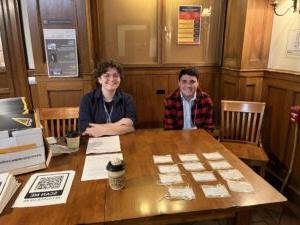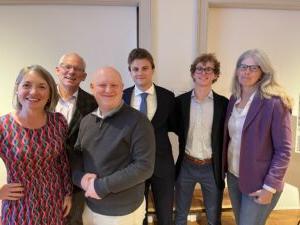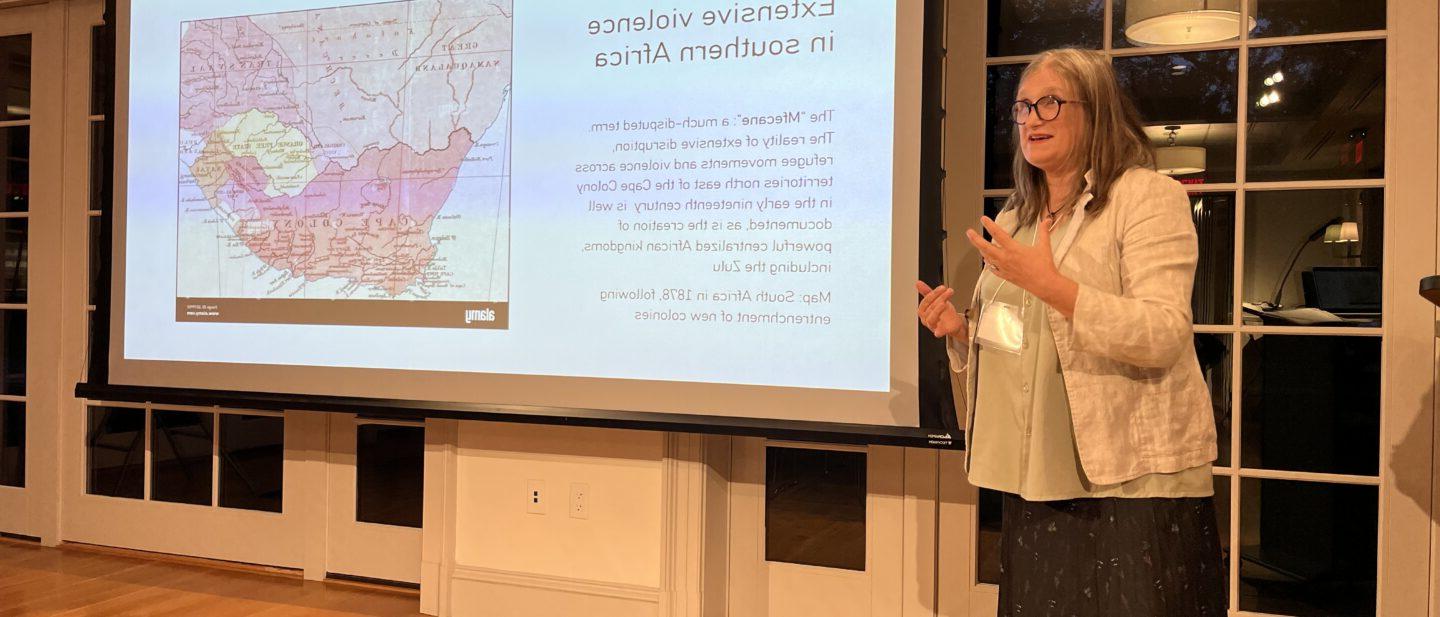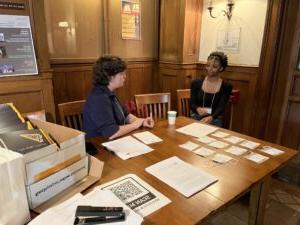History Department hosted Northeast Conference on British Studies (NECBS) September 2024
 The Department of History hosted the annual Northeast Conference on British Studies (NECBS) September 27-28, 2024, welcoming fifty scholars to Hartford from nine countries and thirteen U.S. states. Professor Jennifer Regan-Lefebvre, who is both Chair of History and President of the NECBS, acted as local arrangements chair. The program chair was NECBS Vice-President Professor Mary Conley, associate professor of history at the College of the Holy Cross and a 1990 Trinity graduate. The conference was generously supported by the Philip Bankwitz Fund.
The Department of History hosted the annual Northeast Conference on British Studies (NECBS) September 27-28, 2024, welcoming fifty scholars to Hartford from nine countries and thirteen U.S. states. Professor Jennifer Regan-Lefebvre, who is both Chair of History and President of the NECBS, acted as local arrangements chair. The program chair was NECBS Vice-President Professor Mary Conley, associate professor of history at the College of the Holy Cross and a 1990 Trinity graduate. The conference was generously supported by the Philip Bankwitz Fund.
Photo 1
Friday afternoon and evening panels were held at Trinity’s Innovation Hub in downtown Hartford, and featured a stimulating plenary panel on the future of British studies from Lucy Curzon, Professor of Art History at the University of Alabama, Brendan Kane, Professor of History and Literatures, Cultures, & Languages at the University of Connecticut, and Asheesh Siddique, Assistant Professor of History at the University of Massachusetts). Saturday’s panels were held on the main campus, which was recently designated a historic district, in the Seabury Building, which was (fittingly) designed by an English architect in a Victorian high-Gothic style. On Saturday night the scholars decamped to the historic Webb-Deane-Stevens Museum in nearby Old Wethersfield, where Elizabeth Elbourne, Associate Professor of History at McGill University, delivered an outstanding keynote on settler colonialism and kinship.
Photo 2
“This conference is an annual highlight for scholars working in British studies in New England and eastern Canada,” Regan-Lefebvre explained, “and it’s particularly important for those of us in small liberal arts college to have an opportunity to share research-in-progress with colleagues.” However, one distinctly Trinity element of this conference was how the experience was integrated into History teaching. Twenty-five Trinity undergraduates attended, including the five senior thesis writers and the students in Regan-Lefebvre’s first-year seminar, which was about the British industrial revolution. One first-year undergraduate wrote about the session he attended, that “all the scholars in the audience clearly cared about helping their fellow historians.” He noted that “during the ‘question’ segment, instead of asking questions, people would give suggestions of sources to look into that would help their argument. This is truly when I was able to grasp the amount of time and knowledge it took to study history for a living.”
Photo 3
 Modeling and sharing historical scholarship are also distinctive parts of a Trinity education, and this was evident in the many Trinity alums who are active in the field and participated in the conference. In addition to Mary Conley ’90, we welcomed Paul Deslandes ’86, Professor of History and Associate Dean for Student Success at the University of Vermont; Sanjog Rupakheti ’06, Associate Professor of History at the College of the Holy Cross; and Evan Turiano ’16, Visiting Assistant Professor of History at Wesleyan University.
Modeling and sharing historical scholarship are also distinctive parts of a Trinity education, and this was evident in the many Trinity alums who are active in the field and participated in the conference. In addition to Mary Conley ’90, we welcomed Paul Deslandes ’86, Professor of History and Associate Dean for Student Success at the University of Vermont; Sanjog Rupakheti ’06, Associate Professor of History at the College of the Holy Cross; and Evan Turiano ’16, Visiting Assistant Professor of History at Wesleyan University.
Photo 4
Photo captions:
Photo 1: Elizabeth Elbourne delivering her keynote lecture
Photo 2: History majors Max and Alyssa helped at the registration table
Photo 3: History major Alyssa explains the benefits of declaring a History major to first-year A’Mya
Photo 4: Generations of Trinity historians: left to right, Mary Conley ’90, Alex Willard ’27, Quin McGlame ’25, Zach DelGaizo ’25, Paul Deslandes ’86, and Jennifer Regan-Lefebvre.


